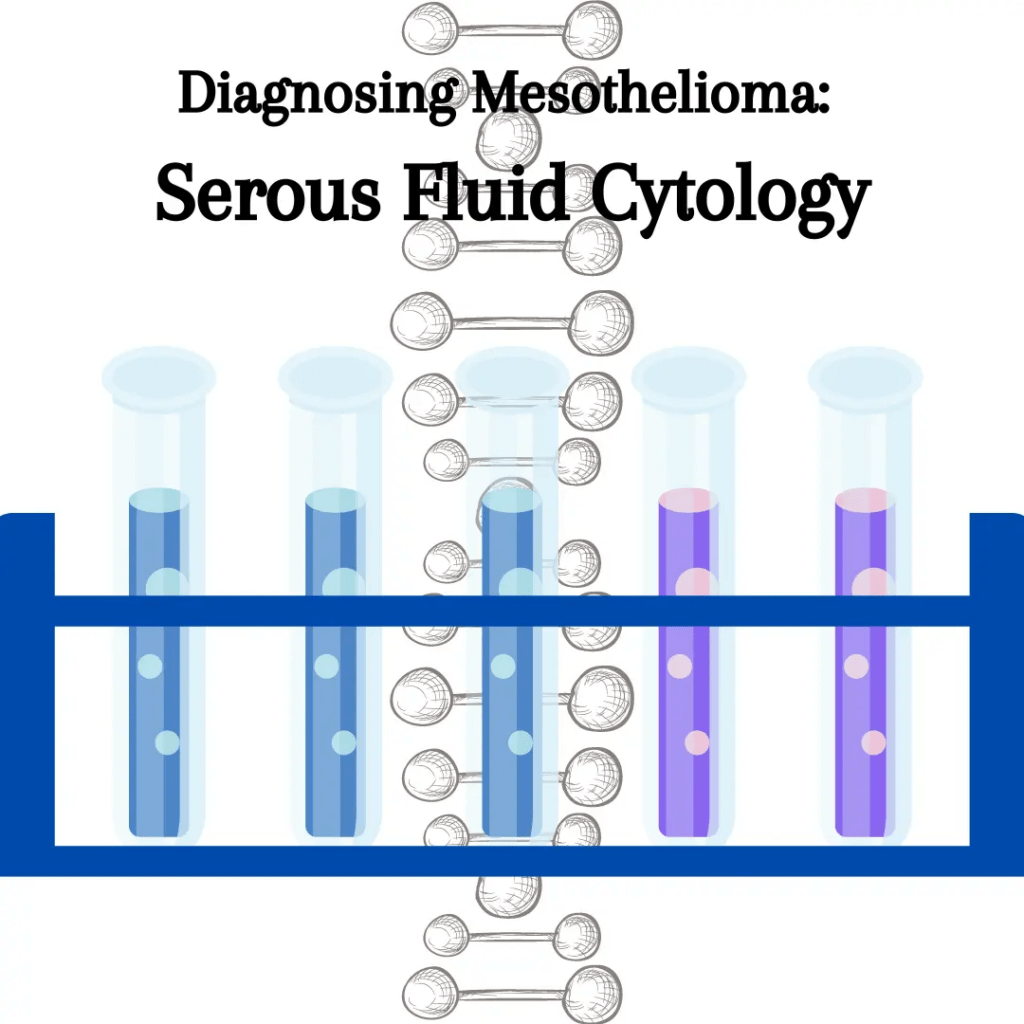Key takeaways: Serous fluid cytology (SFC) is a diagnostic tool in which doctors analyze the serous fluid, or natural secretion of serous membranes, to establish a mesothelioma diagnosis. Although criticized in the past for its non-specific cytological reviews, tests to accompany SFC (called ancillary tests) are changing the diagnostic realm. A review study published in 2024 detailed the efficacy of SFC in one healthcare setting; several patients were diagnosed by way of SFC alone.
What is Serous Fluid Cytology?
Serous fluid cytology (SFC) is a diagnostic technique utilizing serous fluid, which is naturally produced by the body’s serous membranes to lubricate and facilitate the movement of organs. In the context of mesothelioma, serous fluid is likely referring to the fluid surrounding the lungs (although it can be applied to the fluid surrounding the heart or abdomen, in rarer cases). Cytology refers to the identification and differentiation of types of cells: non cancerous and cancerous; epithelioid, sarcomatoid, or biphasic; mesothelioma or carcinoma-adjacent. Serous fluid cytology is similar to a biopsy, in which an organic sample of tissue is extracted and analyzed. Different studies have conflicting evidence about the efficacy of each diagnostic model, i.e., which technique provides a mesothelioma diagnosis with the most speed and accuracy.

Although the SFC technique has been employed by mesothelioma diagnostic models, it receives a fair amount of criticism for its tendency to misconstrue cytological displays. For example, mesothelioma tumors are often heterogeneous, or have different cell types depending on the location of examination. This can make a diagnosis more challenging, especially in the context of SFC: if researchers have established that mesothelioma cells look, act, and are positioned in a certain way, then it makes rarer or heterogeneous manifestations more difficult to initially diagnose. For these reasons, SFC is often used in addition to biopsies, imaging techniques, and other kinds of diagnostic tools, and isn’t usually the “gold-star standard” for a mesothelioma diagnosis.
How is this Diagnostic Technique Useful?
Despite valid criticisms, serous fluid cytology is useful for several reasons: for one, it’s less invasive than a biopsy or surgical means of diagnosis. SFC also facilitates a review of the extracted cells (hence, “cytology”) that other diagnostic tools do not. Plus, SFC allows for an earlier diagnosis–mesothelioma tumors don’t need to be large or metastatic to be detected by SFC. If used with scrutiny and analytical rigor, SFC might revolutionize the diagnosis (and treatment) of mesothelioma.
A recent study (2024) zeroed in the resonance of SFC in a specific healthcare setting, and suggested that SFC was more effective than doctors previously imagined. From the authors’ healthcare institution, they compiled and analyzed data tracking the medium of diagnosis for mesothelioma patients for ten years (2012-2022). They found that ancillary tests, or tests outside of the initial diagnostic test, made SFC more credible. For the purposes of mesothelioma diagnosis, these ancillary tests look at the up or downregulation of certain proteins, the deletion of certain genes that encode for normal cellular growth, or certain byproducts that are characteristic of mesothelioma tumors. In some patients, these ancillary tests were thorough enough to provide a diagnosis without any other diagnostic techniques. Importantly, there isn’t one test that ensures a mesothelioma diagnosis; doctors usually need to rule out other diseases by using a multitude of tests. So, if SFC is a.) relatively noninvasive; b.) provides data for cytological and histological reviews; and c.) can accurately obtain a mesothelioma diagnosis, then it can be implemented in the diagnostic model of mesothelioma.
If you or a loved one has been diagnosed with mesothelioma, please call The Halpern Law Firm at 1 (800)-505-6000. We are here to help you navigate the legal process of filing a claim to receive compensation for your cancer diagnosis. We help mesothelioma victims and their families in Pennsylvania.
Sources: https://www.sciencedirect.com/science/article/abs/pii/S2213294524000206
https://onlinelibrary.wiley.com/doi/abs/10.1002/dc.24663
https://www.ncbi.nlm.nih.gov/pmc/articles/PMC9883572/ Written By Carina Filemyr
Don’t Wait—Contact an Experienced Pennsylvania Mesothelioma Attorney Today!
Now that you know the mesothelioma statute of limitations in Pennsylvania, contact an experienced attorney from our firm to represent your case before time runs out.
At Halpern Law Firm, we help clients throughout Pennsylvania, with offices in Philadelphia, Pittsburgh, Allentown, Scranton and Johnstown. Call us today for a free consultation at (800) 505-6000.
